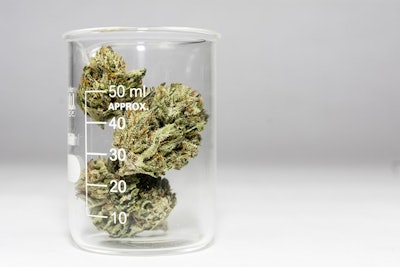
Required cannabis testing is among the changes coming to Arizona’s medical marijuana program under a new law that aligns the state with the dozens of others that have implemented health and safety requirements in their cannabis markets.
Gov. Doug Ducey signed several bills into law in early June, including Senate Bill 1494, which, among other things, requires registered nonprofit medical marijuana dispensaries to test their cannabis products for harmful levels of potential toxins, such as pesticides. (In Arizona “registered nonprofit medical marijuana dispensaries” are vertically integrated business licensees.)
Lawmakers have unsuccessfully attempted to implement cannabis testing requirements in past legislative sessions, but this year, the legislation passed unanimously in both chambers. The bill establishes a 12-member committee of industry representatives, appointed by the Department of Health Services (DHS) director, to assist with drafting rules that will outline testing standards and protocols. The committee will be made up of dispensary owners, a cannabis testing association, a cannabis trade group, cultivators, edible manufacturers, a patient, a designated caregiver, a healthcare provider specializing in drug treatment disorders and a member of the Arizona Department of Public Safety.
“My prediction is that it will be one of the most intelligent, well-thought-through testing models that has been created yet because of the people in the room,” Marijuana Industry Trade Association of Arizona (MITA AZ) Executive Director Demitri Downing told Cannabis Business Times. “There’s room for scientists, and then the state can add people as they choose.”
According to the law, testing will be required on all medical marijuana products sold after Nov. 1, 2020. Regulations include testing protocol for potency, pesticides, residual solvents, heavy metals and microbes.
“This was our third year of trying to get a testing bill to pass, so it’s a real relief,” Mikel Weisser, the executive director for Arizona NORML, told Cannabis Business Times. “They ended up having up to 15 different stakeholders in some of the meetings that we held to get everybody on board.”
NORML backed a testing bill in last year’s legislative session, Weisser said, which failed in its final vote, and that measure became the foundation for this year’s efforts.
“Patients need and deserve to know what is in the products they are consuming,” said Jared Moffat, a political director for the Marijuana Policy Project (MPP). “The goal of the program is to help people with debilitating health conditions—the last thing we want to see is products on the shelf that are making them sick.”
The state has not yet established a licensing regime for cannabis testing facilities, but that program is also being created under the new law, Weisser said.
Preparing for Testing
Arizona’s cannabis businesses should perform internal testing to get ahead of any problems, Weisser said. “It’s true that mold spores are really ubiquitous in America, but if you have healthy, sanitary conditions, that mold won’t develop. So, if [businesses are] keeping track of their facilities and doing internal testing throughout the process of the growing and the processing, then they’ll do better.”
AJ Montgomery, head of marketing for Huxton, a national cannabis brand in Washington, Nevada and California that will soon expand into the Arizona market, told Cannabis Business Times that Arizona’s cannabis businesses will likely be taking a reactive rather than proactive approach to the state’s new testing rules.
“I think in Arizona, there are going to be a lot of license holders that need to be reactive because of their current practices,” he said. “Because of those mistakes that are inherent to any industry looking to polish itself up and make sure that it's growing and evolving in the right direction, existing license holders need to be reactive. They're about to learn what will pass the test. They're about to learn what standards they will be held to.”
Huxton chooses which licensed partners to work with, and Montgomery said the company vets potential partners to ensure they have organic methods to keep plants healthy. “We have our proactive checklist so we're able to identify the best partners possible, in Arizona and outside of Arizona.”
And working with companies in Arizona that now must adhere to testing standards will make this vetting process easier, Montgomery added. “As soon as it is mandatory to have your product pass the test [and] you are required to tell the truth on your packaging—when you're required to be as transparent as possible and give every bit of information that you'd want [as] an end buyer—I think it's fantastic.”
Broader Changes
Also included in Senate Bill 1494 is a provision that allows medical marijuana patients to renew their state-issued cards every two years, instead of annually. Lowering card costs was a legislative goal set by MITA AZ two years ago, and with the passage of Senate Bill 1494, the $150 annual fee for card renewal becomes a biannual fee.
Another provision in the bill mandates that the next set of medical dispensary licenses issued by the state will go to rural populations with the greatest need.
“The way that Arizona’s medical program was originally written, to entice dispensaries to open up in rural locations, they allowed them to relocate to bigger cities after three years,” Weisser said. “This has led to about 2,000 rural dispensaries closing down, moving into the city [and] abandoning those rural areas.”
The legislation also allows the DHS to conduct inspections of the state’s licensed cannabis businesses and take disciplinary action against noncompliant operations. “Up until now, DHS didn’t have any authority to do anything less than revoking a company’s license for misbehavior,” Weisser said. “No fines, no hearings, no warnings—none of those things were a tool in their tool chest.”
Next year, MITA AZ will launch efforts to remove the cap on the amount of cannabis a patient can buy from a dispensary, Downing said. “You’ve got to keep pushing, no matter how tall that windmill is. MITA will be introducing removing the quantity amount from 2.5 ounces every two weeks to … unlimited because that makes more sense. People with chronic conditions, they have to make their own determination as to what they need.”
MITA AZ will also push for legislation next year that allows doctors to determine which conditions are appropriate to treat with medical cannabis, Downing added, as well as reciprocity provisions to honor out-of-state medical cards.
All of these measures would increase access in what is already a substantial medical cannabis market, he said. “We have a huge market—somewhere between $500 million and $1 billion. There are 131 licenses in Arizona. It’s a limited licensing state. It’s vertically integrated, but of course the cultivation licenses can support the dispensaries, so it’s really well-structured for entrepreneurs business-wise.”
Arizona is, however, a slower moving state when it comes to embracing changes in its cannabis policy, Montgomery added. “Arizona is a conservative market. There's a lot that will move slower in Arizona just because of the more conservative mindset of adopting something and adapting with it. I think that if Arizona, as a more conservative state … when it comes to marijuana, can lay out a guideline of here’s how we regulate, here’s how we define certain things and here’s what we allow to be sold and why, I think it'll really be helpful for … opening up eyes and other states that are also conservative [can] see some sort of a look into the future."
Editor's Note: Digital Editor Eric Sandy contributed reporting to this story.

























